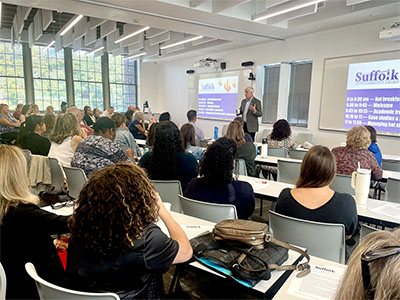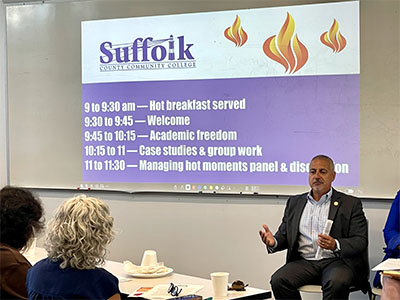October 2024
“You’re stupid and you should stop talking right now!” a student suddenly snaps at a classmate, and afterward the exchange manifests as a physical altercation in the parking lot. A faculty member comes into the FA office upset because a student had registered a complaint, and they aren’t sure about all the questions now being directed at them by administration. After a particularly controversial issue is discussed in class, a student abruptly asks the professor in front of everyone what he personally believes about the matter. A writing center tutor becomes engaged in a dispute with a student who got angry and began yelling at them. These situations and others were shared during a packed morning on Friday, September 13, during the Navigating Controversial Topics on Campus workshop. Co-sponsored by the FA, Guild and administration, the workshop began with a hot breakfast and coffee and included panel discussions, a presentation, case studies and some Q&A. Given the complexity of the topics addressed and the fact that Kreiling Hall Room 203A/B was literally standing room only, I am subdividing this review into three separate articles: Considering multiple perspectives (below), What academic freedom does and does not mean and Managing hot moments. Considering multiple perspectives While the political environment is challenging right now, Vice President for Academic Affairs Irene Rios noted, it is a “wonderful privilege” for us as educators to be in our positions. She said, “Today gives us an opportunity to focus on our commitment to academic freedom and guiding robust conversations in our classrooms to better help our students” and noted that the Center for Teaching and Learning would be hosting follow up workshops on these topics.
Special guest Legislator Jim Mazzarella joined us for the morning panel presentation, and we are grateful to him for making the time to participate. For his first two years in the Legislature, Jim had chaired the education and labor committee. After some restructuring, he now serves as vice chair of the education and diversity committee as well as chair of the labor and consumer affairs committee. “I’ve been a labor leader for 34 years,” Legislator Mazzarella noted, “and unions and working people are of foremost importance to me.” Given the challenging political environment, and because he represents a diverse area on the South Shore, Jim says, “politics will inevitably enter the picture.” We know that Suffolk County is a fairly evenly divided region—with 376,665 registered Democrats and 345,361 registered Republicans as of February 2024—when issues arise for him as an elected representative, he says it’s really important to “have a pulse on who you are representing, their struggles and needs” and “to bring it back to the people.” It’s a wise approach for us at the college too: to keep our bringing back our focus to what’s best for the students we serve every day. Continue on to read part 2: What academic freedom does and does not mean |


